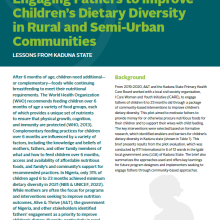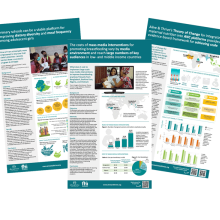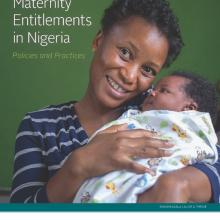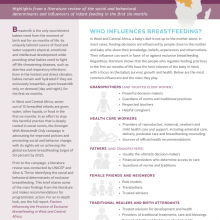Brief
Jul 11 2023

Engaging Fathers to Improve Children's Dietary Diversity in Rural and Semi-Urban Communities: Lessons from Kaduna State
From 2019-2020, A&T and the Kaduna State Primary Health Care Board worked with a local civil society organization, I Care Women and Youth Initiative (ICARE), to engage fathers of children 6 to 23 months old through a package of community-based interventions to improve children’s dietary diver
Presentation
Jan 12 2023

Adolescent nutrition, maternal nutrition theory of change and media costs posters presented at the SBCC Summit
Three posters on mass media costing, scaling up maternal nutrition, and school-based nutrition highlight results from some of Alive & Thrive's implementation research in Africa and Asia. They were shared at the 2022 SBCC Summit in Marrakech, Morocco, in December.
Journal article
Jun 14 2022

Behavior Change Communication Implemented at Scale in Nigeria Increases the Prevalence of Key Infant and Young Child Feeding Practices (Current Developments in Nutrition, 2022)
Brief, Handout, Poster/Graphic, Report
Sep 19 2019

Maternity Entitlements in Nigeria: Policies and Practices
Despite globally accepted knowledge on the benefits of breastfeeding and the contribution of maternity entitlements to increasing rates of exclusive breastfeeding, there has been little research on how maternity or paternity leave is practiced in Nigeria, the labour force’s level of compliance, o
Brief
Oct 23 2018

Nigeria nutrition profiles
Nigeria has recently made progress toward strengthening policies and programs in support of maternal, infant and young child nutrition (MIYCN). However, progress has been limited to specific states—and creating strong plans for implementation of new policies remains a challenge.


